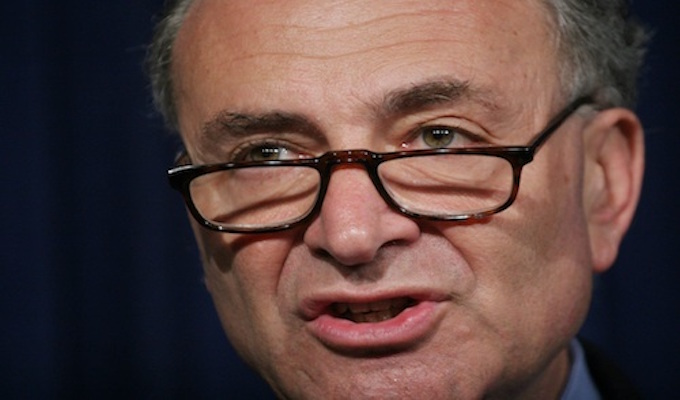Granted, no one expected Senate Democrats to embrace President-elect Donald Trump’s Cabinet nominees. But is it too much to expect coherence in their arguments?
The Washington Post reports that Senate Democrats “plan to aggressively target eight of Donald Trump’s Cabinet nominees” and stretch the confirmation process into March, which is an “an unprecedented break with Senate tradition.”
The supposed reason for this obstructionism is that they want “reams of personal financial data” from the Cabinet picks.
Minority Leader Charles Schumer, D-N.Y., suggests many Trump nominees “have made billions off the industries they’d be tasked with regulating.”
“Any attempt by Republicans to have a series of rushed, truncated hearings before Inauguration Day and before the Congress and public have adequate information on all of them is something Democrats will vehemently resist,” Schumer said in a statement to the Post. “If Republicans think they can quickly jam through a whole slate of nominees without a fair hearing process, they’re sorely mistaken.”
Obviously, confirmation hearings should be thorough, and potential conflicts should be vetted. Here’s the problem for Democrats: There are no obvious financial conflicts, and any implication that most of these nominees have made “billions” is laughable.
The eight Cabinet nominees Democrats plan to slow-play include Oklahoma Attorney General Scott Pruitt, who has been nominated to head the Environmental Protection Agency. If Pruitt has become fabulously wealthy off the industries he’s about to regulate, he’s done a good job disguising the fact.
Among the other nominees facing Democratic obstruction are Sen. Jeff Sessions, R-Ala. (attorney general); Rep. Mick Mulvaney, R-S.C. (Office of Management and Budget), and Rep. Tom Price, R-Ga. (Department of Health and Human Services).
Notably, members of Congress are already required to file financial disclosure forms. One wonders how this escaped Democrats’ notice.
In the case of Sessions, Schumer apparently wants people to believe Democratic senators know nothing about a man who has served alongside them for two decades. Sessions also served as a prosecutor and state attorney general prior to his Senate service. Does this mean Democrats think there’s a financial conflict if the nation’s top prosecutor previously earned his living … as a prosecutor?
The same question applies to Price, one of the few doctors serving in Congress. Do Democrats truly think the person responsible for oversight of federal health care policy should have no relevant experience in health care? (Admittedly, that would explain much about Democrats’ approach to health care policy in the past eight years.)
The simple fact is that Democrats have no valid objections to any of Trump’s nominees because, if they did, they would have publicized them by now. When Democrats are reduced to demanding financial disclosures from nominees who have already been providing them for years, it’s a good sign Trump has made solid choices for his Cabinet.
This doesn’t mean Democrats will like those nominees, but their objections are based on ideological grounds, not ethical concerns. By pretending otherwise, Senate Democrats aren’t giving the public reason to oppose Trump’s nominees. They’re only making themselves look foolish.
___
(c)2017 The Oklahoman
Visit The Oklahoman at www.newsok.com
Distributed by Tribune Content Agency, LLC.
—-
This content is published through a licensing agreement with Acquire Media using its NewsEdge technology.



















Recent Comments